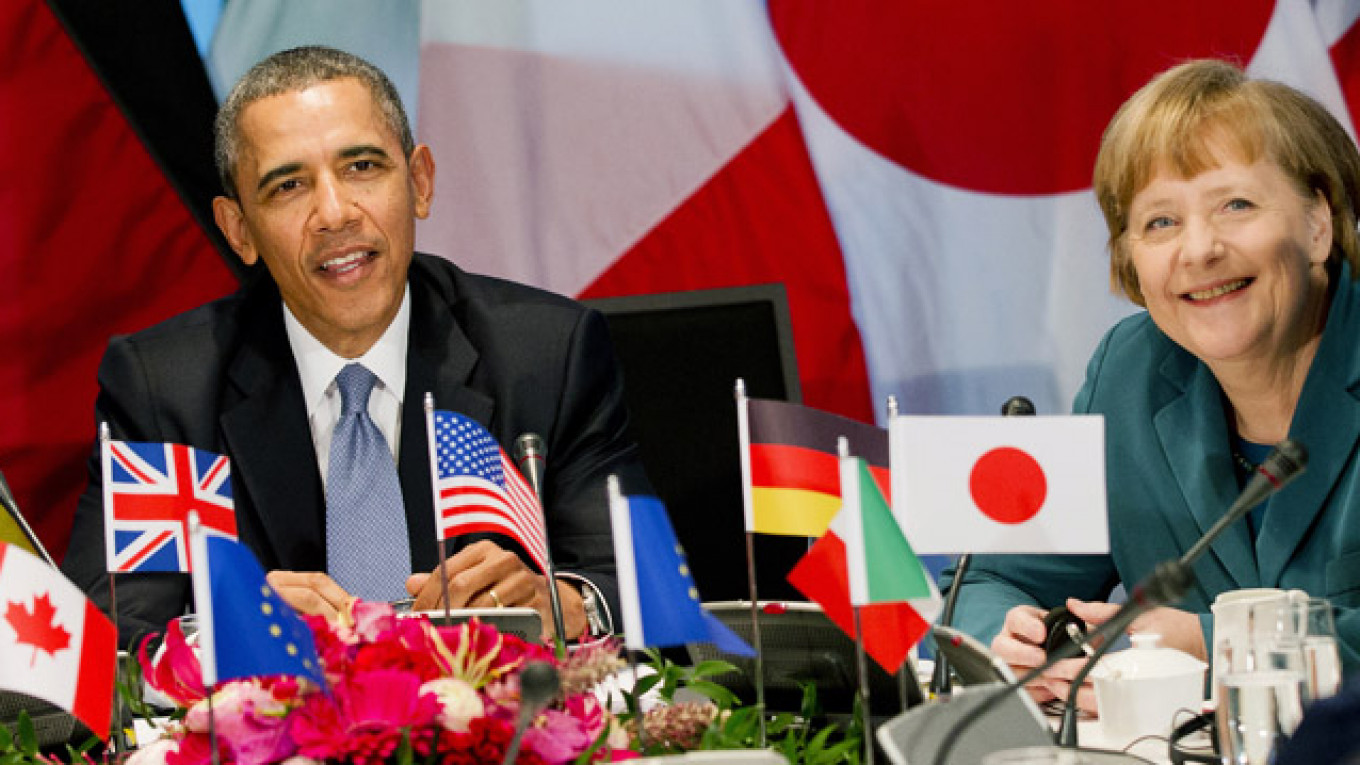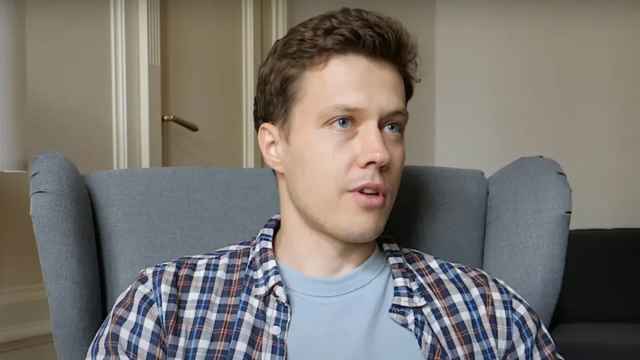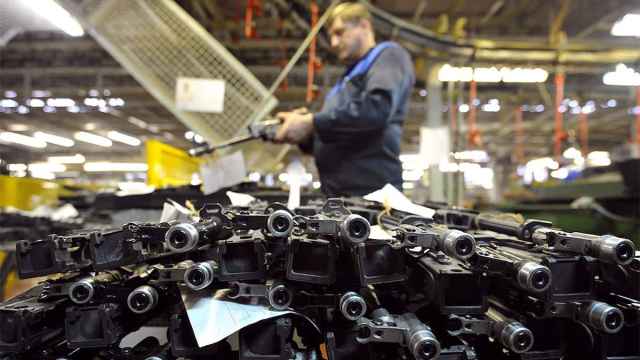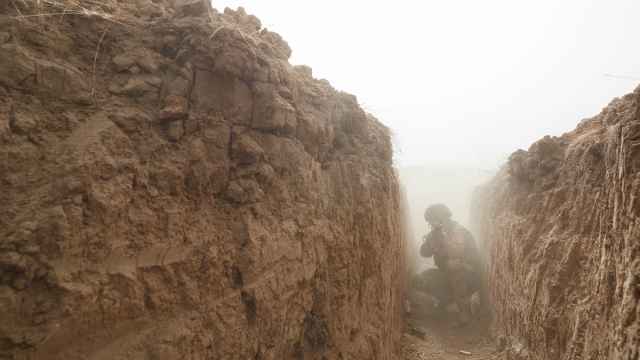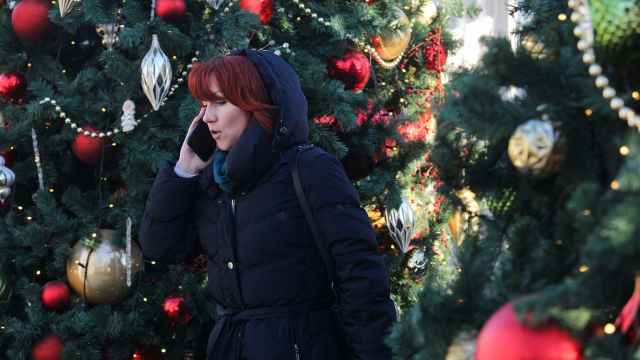President Barack Obama heads to Warsaw, Brussels, Paris and Normandy this week where he is expected to elaborate on the U.S. commitment to counter Russian moves against Ukraine and reassure nervous allies the United States has their backs.
In Poland, Ukraine's western neighbor, Obama meets with Eastern European leaders — including Ukraine's president-elect, Petro Poroshenko, on Wednesday — and is expected to address criticism he has not done enough to push back against Moscow after it annexed Crimea in March.
The president's trip follows a speech at the U.S. Military Academy last week in which he argued that American leadership in the world should be exercised mainly by diplomacy, multilateral action and economic pressure, as in Ukraine, rather than through military might.
"Our ability to shape world opinion helped isolate Russia right away. Because of American leadership, the world immediately condemned Russian actions," Obama said.
But when Obama meets in Warsaw with leaders from 10 nations from Central and Eastern Europe, analysts say he will be urged to articulate a clearer plan to help prevent more instability in the region.
"There's a concern that we will disappear, we will fade, when the next crisis hits us," said Heather Conley of the Center for Strategic and International Studies in Washington.
Obama has long faced calls from Eastern European statesmen to be more forceful, including from Lech Walesa, who led Poland's Solidarity trade union movement that played a critical role in the overthrow of communism in the 1980s.
Walesa, a former Polish president, said in an interview on Poland's TVN24 television network last week that he was disappointed in what he considered Obama's insufficiently robust approach to the Ukraine crisis.
"The superpower has not been up to the job, and therefore the world is at a dangerous point and maybe it really is the case that lots of bad things are happening in the world because there is no leadership," Walesa said.
Symbolism
Americans supported pro-democracy activists during martial law that was imposed in Poland in 1981, and backed their struggle for the first free elections 25 years ago, recalled Ryszard Schnepf, who was part of the Solidarity movement.
Obama's visit is "kind of a sentimental treat to Poland" on the "Freedom Day" anniversary of those elections, Schnepf, now Poland's ambassador to the United States, said in an interview.
Poland is grateful for U.S. support in the current crisis, but leaders want more, he said. "We are supporting the idea of more engagement of the United States in the region," he said.
Obama is slated to give an address on U.S.-European relations on Wednesday at the "Freedom Day" celebration.
The White House is considering ideas for more military "rotational deployments" or additional personnel in the region, Ben Rhodes, Obama's deputy national security adviser, told reporters.
But Obama is not expected to make major announcements on the trip. Rather, his mission is one of reassurance.
"What you've got with each stop is a lot of symbolism," said James Goldgeier of American University's School of International Service.
G7, Not G8
After Poland, Obama heads to Brussels to meet with the G7. The summit of the major economic powers had originally been planned for Sochi in Russia until Moscow was suspended from the group — then the G8 — over the Ukraine crisis.
Russia has since taken steps to pull back troops it deployed at the border earlier this year and Ukraine's presidential election went ahead without major problems, so it appeared unlikely the G7 would push for further economic sanctions against Moscow.
"At present, all partners are agreed that the goal is to move toward a de-escalation and no new sanctions are envisaged at this time," an official in French President Francois Hollande's office told Reuters.
"The idea is more to do all that we can to restore dialogue," the official said.
Obama then heads to France on Friday to mark the 70th anniversary of D-Day, when Allied troops stormed the Normandy beaches in the invasion that led to the defeat of Nazi Germany in World War Two.
Russian President Vladimir Putin, who will attend the ceremonies, is due to meet with Hollande in Paris on Thursday. Obama is also slated to dine with Hollande that evening, but the White House said Obama and Putin had no formal meetings scheduled.
See also:
A Message from The Moscow Times:
Dear readers,
We are facing unprecedented challenges. Russia's Prosecutor General's Office has designated The Moscow Times as an "undesirable" organization, criminalizing our work and putting our staff at risk of prosecution. This follows our earlier unjust labeling as a "foreign agent."
These actions are direct attempts to silence independent journalism in Russia. The authorities claim our work "discredits the decisions of the Russian leadership." We see things differently: we strive to provide accurate, unbiased reporting on Russia.
We, the journalists of The Moscow Times, refuse to be silenced. But to continue our work, we need your help.
Your support, no matter how small, makes a world of difference. If you can, please support us monthly starting from just $2. It's quick to set up, and every contribution makes a significant impact.
By supporting The Moscow Times, you're defending open, independent journalism in the face of repression. Thank you for standing with us.
Remind me later.


